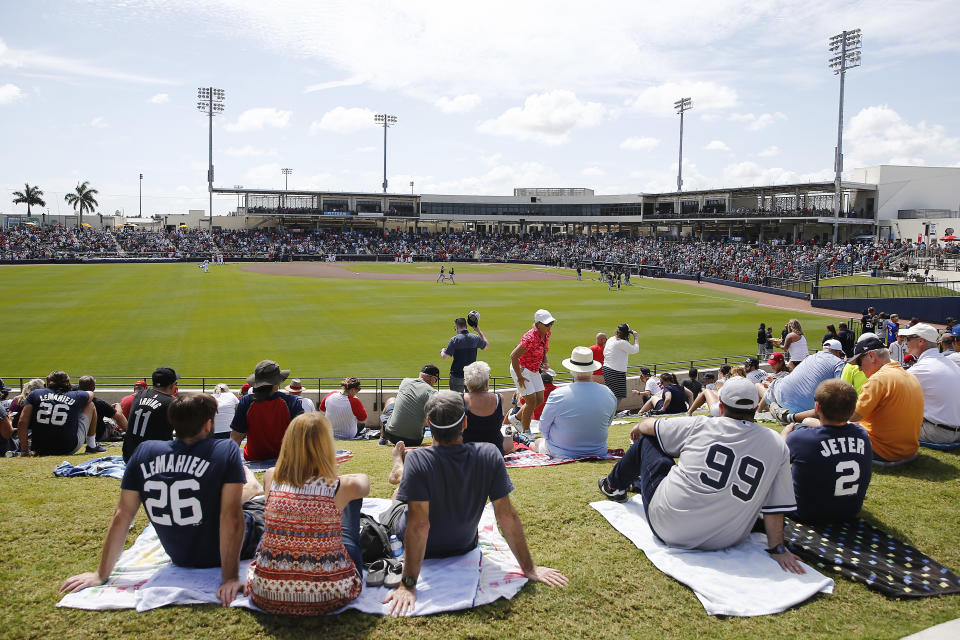MLB move to suspend games is a belated, necessary coronavirus safeguard
Yu Darvish, wearing a T-shirt featuring Washington Wizards rookie Rui Hachimura, had just seen the news that the NBA was suspending its season indefinitely in response to a player testing positive for the coronavirus. Wednesday night, while the basketball world was imploding, the Chicago Cubs starter was throwing a strong 70-pitch spring training outing in an uncharacteristic desert rain. When he came back to the Cubs’ complex he saw that the American sporting landscape had started to crumble. Did it concern him for what might happen in baseball?
“At some point somebody will get coronavirus, I think,” he said plainly. “But if somebody gets it, I think MLB will do the same thing as the NBA.”
Major League Baseball did not wait for a player to test positive before canceling spring training and delaying opening day by at least two weeks. That is the right call; if anything, it is unnecessarily, dangerously belated.
Less than 24 hours ago, Darvish’s nonchalant assumption that a major leaguer will contract the coronavirus looked like a shocking departure from the business-as-usual mentality that has been espoused around spring training until today and projected by MLB’s previous plan to continue playing meaningless exhibition games. But it’s also the only reasonable conclusion an intelligent person could make given the ballooning projections of the pandemic — with some experts saying that it’s not implausible that a full half of the U.S. population will get the coronavirus.
As it stood, baseball players were not self-quarantining, they were not social distancing or planning to limit travel. They were not avoiding crowds larger than 250 people or 1,000 people. In the past day, teams have started to ground their scouts and MLB previously recommended limiting travel for nonessential non-player personnel. But ultimately dozens of support staff that each team employs, dozens of stadium event workers and hundreds if not thousands of fans are exposed to one another each time a baseball game is played — exhibition or otherwise.

If games continued, someone in baseball was going to get the coronavirus, forcing the league to act quickly and frantically. For what feels like a while now (but who can tell when each day is a month long), MLB has been treating their preseason status as a chance to delay any official decision, waiting for local governments to force their hand. With opening day still a few weeks off, the league was trying to contain accommodations to individual teams in cities with the greatest outbreak, leaning into potential piecemeal solutions while downplaying the need for a league-wide course of action.
This is not unreasonable when you account for the gargantuan logistical considerations and far-ranging economic implications of upending the baseball season. From television rights deals to hourly stadium employees, from the careful ramp-up of pitchers for opening day to the complicated scheduling puzzle of a condensed season.
But the chance to act proactively is powerful. It’s a luxury, really, and one the league should have taken seriously even sooner. Unlike the NBA and the NHL, MLB can plan ahead — take stock and set a new opening day, decide on a season length and structure before it gets underway. It can protect its players and the playoffs at the same time. It’s complicated, but it’s not a worst-case scenario.
Switching home fields or staying in spring training facilities was a head-in-the-sand response that would have implicitly encouraged fans to travel out of state, to cities populated by vulnerable retirees. Waiting for a critical mass of diagnosed cases before taking the plight of a particular city seriously willfully ignores the national test shortage and all the urgent reports about contagious incubation periods and asymptomatic healthy people who could still spread the virus among vulnerable populations.
Shuttering stadiums and suspending play is a public good.
For as long as there are games and ticket takers, fans will show up. Because they’re misinformed about the how exponentials work. Because they’re cavalier or callously unconcerned about their role in a communal crisis and the importance of “flattening the curve.” Because they trust public institutions to do what’s best for the public. That trust is often misplaced. But at least for now, under tremendous pressure from municipal decisions and the actions of other leagues, MLB finally did the right thing.
More from Yahoo Sports:

 Yahoo Finance
Yahoo Finance 
